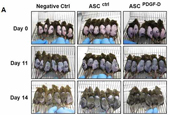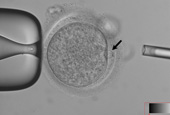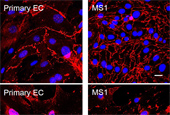-
 Korea.net's 24-hour YouTube channel
Korea.net's 24-hour YouTube channel- NEWS FOCUS
- ABOUT KOREA
- EVENTS
- RESOURCES
- GOVERNMENT
- ABOUT US
Researchers have discovered a substance that can induce the movement of stem cells from bone marrow to blood vessels. This allows them to target damaged tissue in the blood vessels and to treat deficiencies in the blood supply and other ischemic diseases.
A joint team of researchers from Ajou University and Pusan National University announced on November 30 that taurousodeoxycholic acid (TUDCA), a type of bile acid, induces the movement of endothelia progenitor cells (EPCs) and helps treat ischemic diseases.
Due to the increased consumption of meats and an aging population, there has been a rising number of patients with ischemic vascular diseases, a severe chronic disease. However, existing treatment methods, including surgery and medication, does not result in any fundamental treatment.
Researchers extracted and cultivated EPCs from human peripheral blood and cord blood. Using various analyses, they then confirmed that the separated cells were EPCs. EPCs are stem cells that are present in marrow-derived blood and help form new blood vessels.
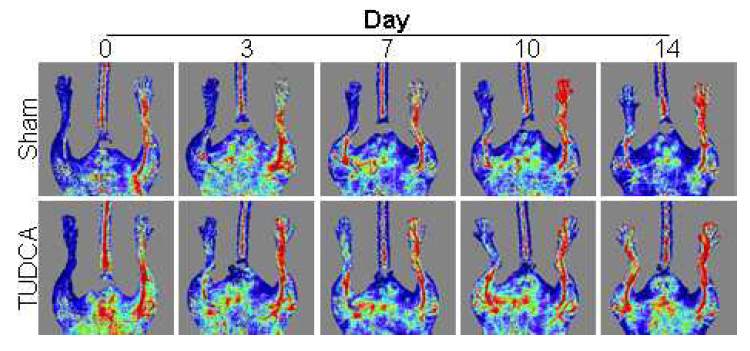
Researchers used the TUDCA to help EPCs reach damaged blood vessels and later confirmed that the blood vessels were regenerated. TUDCA is produced in the liver and stored in the gall bladder before it is secreted. It is a combination of taurine and ursodeoxycholic acid (UDCA), a major substance present in bile. Only a small amount of TUDCA is present in a human body.
According to the results, TUDCA can be used as a stem cell mobilizer that induces the movement of stem cells from bone marrow via peripheral blood vessels.
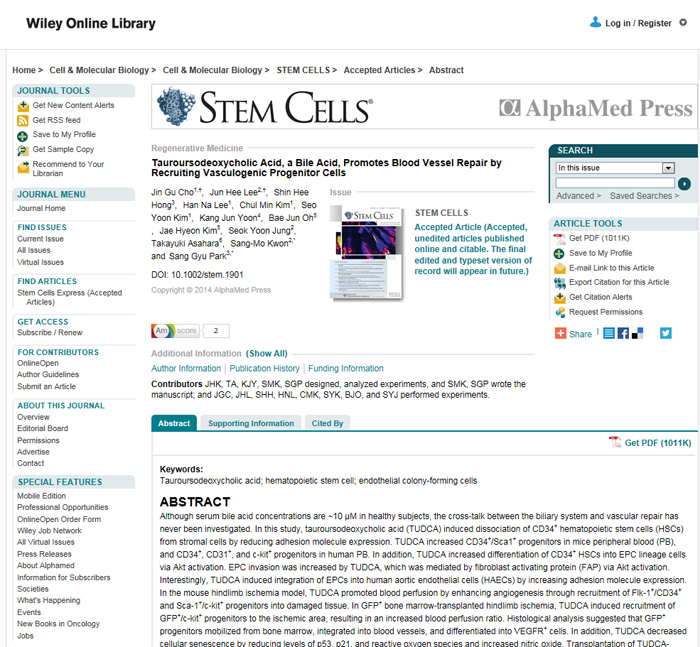
"Unlike the existing treatment, bile acid, which is present in one's body, can be effectively used for the stem cell treatment of ischemic diseases, with no negative side effects," said a researcher.
The research was conducted as part of a bio- and medical-technology development project supported by the Ministry of Science, ICT and Future Planning. The results were published in the online edition of Stem Cells on November 19. (www.ncbi.nlm.nih.gov/pubmed/24424209)
By Limb Jae-un
Korea.net Staff Writer
Photos courtesy of the Ministry of Science, ICT and Future Planning
jun2@korea.kr

A joint team of researchers from Ajou University and Pusan National University announced on November 30 that taurousodeoxycholic acid (TUDCA), a type of bile acid, induces the movement of endothelia progenitor cells (EPCs) and helps treat ischemic diseases.
Due to the increased consumption of meats and an aging population, there has been a rising number of patients with ischemic vascular diseases, a severe chronic disease. However, existing treatment methods, including surgery and medication, does not result in any fundamental treatment.
Researchers extracted and cultivated EPCs from human peripheral blood and cord blood. Using various analyses, they then confirmed that the separated cells were EPCs. EPCs are stem cells that are present in marrow-derived blood and help form new blood vessels.

After TUDCA is orally injected into mice infected with ischemic diseases, blood vessels regenerate and blood starts to circulate normally.
Researchers used the TUDCA to help EPCs reach damaged blood vessels and later confirmed that the blood vessels were regenerated. TUDCA is produced in the liver and stored in the gall bladder before it is secreted. It is a combination of taurine and ursodeoxycholic acid (UDCA), a major substance present in bile. Only a small amount of TUDCA is present in a human body.
According to the results, TUDCA can be used as a stem cell mobilizer that induces the movement of stem cells from bone marrow via peripheral blood vessels.

Research results are published in the online edition of Stem Cells.
"Unlike the existing treatment, bile acid, which is present in one's body, can be effectively used for the stem cell treatment of ischemic diseases, with no negative side effects," said a researcher.
The research was conducted as part of a bio- and medical-technology development project supported by the Ministry of Science, ICT and Future Planning. The results were published in the online edition of Stem Cells on November 19. (www.ncbi.nlm.nih.gov/pubmed/24424209)
By Limb Jae-un
Korea.net Staff Writer
Photos courtesy of the Ministry of Science, ICT and Future Planning
jun2@korea.kr
Most popular
- First hearing-impaired K-pop act hopes for 'barrier-free world'
- 'Mad Max' director impressed by 'cinema-literate' Korean viewers
- Romanian presidential couple visits national cemetery
- 'Korean mythology is just as wonderful as Greek and Roman'
- Hit drama 'Beef' wins awards from 3 major Hollywood guilds









